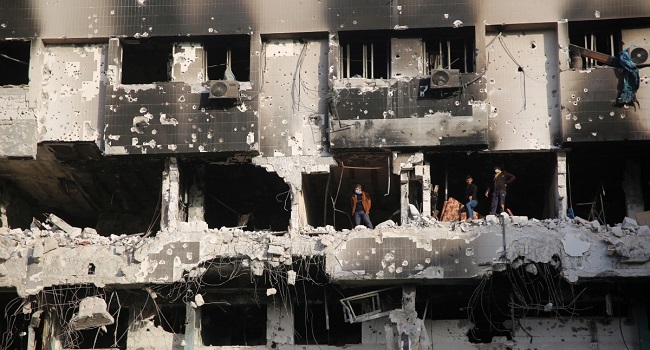Foreign
Gaza’s Al-Shifa hospital devastated In two-week battle

Israeli forces on Monday pulled out of Gaza’s largest hospital complex after an intensive two-week military operation, leaving behind charred buildings and bodies strewn at the sprawling complex.
Israel said it had battled Palestinian militants hiding inside Gaza City’s Al-Shifa Hospital, killed at least 200 enemy fighters and recovered large stockpiles of weapons, explosives and cash.
The health ministry in Hamas-ruled Gaza said that, after heavy Israeli air strikes and tank fire, “the scale of the destruction inside the complex and the buildings around it is very large”.
“Dozens of bodies, some of them decomposed, have been recovered from in and around the Al-Shifa medical complex,” the ministry said, adding that the hospital was now “completely out of service”.
A doctor told AFP more than 20 bodies had been recovered, some crushed by withdrawing vehicles.
Battles have also flared around other Gaza hospitals almost six months into the war sparked by Hamas’s October 7 attacks which have destroyed swathes of the besieged coastal territory.
The Hamas government press office said the army had blown up more than 20 houses within 24 hours in the main southern city of Khan Yunis, where battles have raged around the Nasser and Al-Amal hospitals.
Israel street protests
US, Qatari and Egyptian mediators have long pushed for a ceasefire and hostage release deal, but Hamas official Osama Hamdan said “there is no talk so far about any new round of negotiations”.
UN agencies and humanitarian aid groups have warned that many of Gaza’s 2.4 million people are on the brink of famine, and donor countries have sporadically trucked in and airdropped food.
A second ship carrying relief goods via the Mediterranean was just off Gaza’s coast on Monday, according to website Vesselfinder.com, days after leaving Cyprus.
Israeli Prime Minister Benjamin Netanyahu — whose office said he underwent a “successful” hernia operation Sunday — has vowed to destroy Hamas, including in Gaza’s far-southern city of Rafah.
The premier was “in good shape and beginning to recover”, his office said in a statement.
Netanyahu is under rising pressure from the hostages’ families and supporters as well as anti-government protesters, whose nightly street rallies have gathered pace and drawn many thousands onto the streets.
The right-wing premier has also been at odds with Israel’s top ally the United States, which has objected to his plans to invade Rafah because the city is crowded with about 1.5 million people.
After Netanyahu earlier cancelled an Israeli government delegation’s visit to Washington to discuss the Rafah operation, a meeting is set for Monday via video conference, an Israeli source told AFP.
“There may be a meeting in person later this week,” said the source, speaking on condition of anonymity.
Hamas chief’s sister arrested
The bloodiest ever Gaza war erupted when Hamas launched its unprecedented October 7 attack which resulted in about 1,160 deaths in Israel, mostly civilians, according to an AFP tally of Israeli official figures.
Israel’s retaliatory campaign has killed at least 32,782 people, mostly women and children, according to the Gaza health ministry.
Deadly air strikes again pounded Gaza early Monday, and battles raged in Gaza City and Khan Yunis, as the health ministry said at least 60 people had died during the night.
The Israeli military said Monday that 600 soldiers had been killed since the start of the war — including 256 in the Gaza ground invasion since late October.
Palestinian militants also seized around 250 hostages. Israel believes about 130 remain in Gaza, including 34 who are presumed dead.
Israeli police meanwhile said they had arrested the sister of Qatar-based Hamas leader Ismail Haniyeh, as part of a terror probe, in the southern Israel town of Tel Sheva.
Police told AFP that Sabah Abdel Salam Haniyeh, 57, who is an Israeli citizen, was taken into custody as part investigation also involving Israel’s security agency Shin Bet.
A police spokesman said she is “suspected of having contact with Hamas operatives and identifying with the organisation, while inciting and supporting acts of terrorism in Israel”.
Battle destroys hospital
Over the past two weeks, the Israeli army carried out what it labelled “precise operational activity” at the Al-Shifa complex, before declaring on Monday that the forces had withdrawn.
The scene left behind was one of devastation, with windows blown out, concrete walls blackened and volunteers carrying away shrouded corpses across the sandy wasteland.
Dozens of air strikes and shelling had hit the area around the complex in the morning, in heavy fire which the Hamas government media office said served to provide cover for the withdrawing troops and tanks.
The army has in recent days released footage of its fighters moving through the hospital’s corridors, and pictures of large numbers of assault rifles, grenades and other weapons it said were recovered from the maternity ward.
The military has said 200 Hamas and Islamic Jihad militants were killed in fighting in and around Al-Shifa.
Hamas has denied operating from Al-Shifa and other health facilities.
An Israeli strike also hit “a tent camp” inside central Gaza’s Al-Aqsa hospital compound, killing four people, said World Health Organization chief Tedros Adhanom Ghebreyesus on social media platform X.
Israel’s military denied that the hospital was damaged, saying on X that an aircraft had “struck an operational Islamic Jihad command centre and terrorists positioned in the courtyard of the Al-Aqsa Hospital”.





![Nigeria Gets Opponent for 2026 FIFA World Cup Play-Off [Full list]](https://thepapers.ng/wp-content/uploads/2026/02/FIFA-U20-Womens-World-Cup-80x80.jpg)






